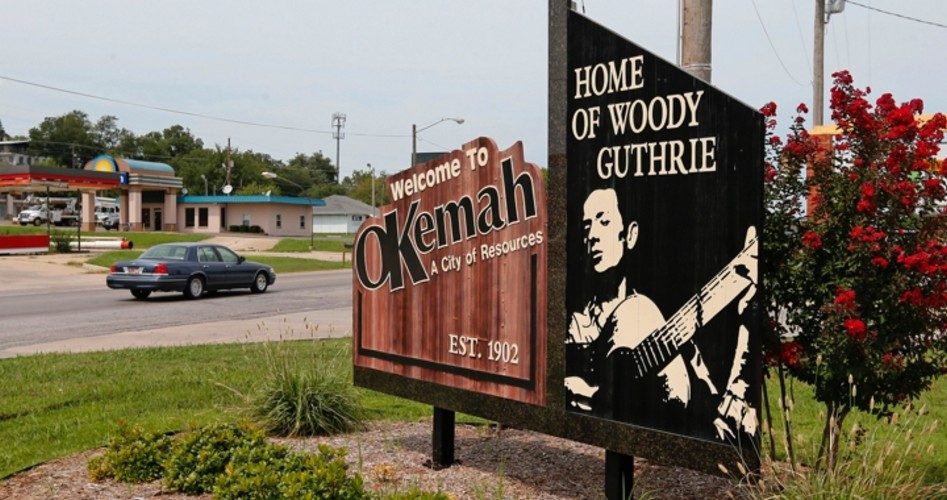
The 2017 Woody Guthrie Folk Festival opens tonight at 8 p.m. at the Crystal Theatre in Guthrie’s home town of Okemah, Oklahoma. It runs from July 12 through Sunday night, July 16.
Brad Piccolo of the Red Dirt Rangers told the Oklahoman newspaper, “This is our chance to pay homage to him.”
Okemah residents have been paying “homage” to Guthrie with a folk festival for more than two decades now, scheduled on the weekend closest to Guthrie’s July 14 birthday.
It is somewhat appropriate, considering that his birthday is also the anniversary of the storming of the Bastille during the bloody leftist French Revolution. Vladimir Lenin, the revolutionary who led the Bolshevik Revolution in Russia in 1917, referred to the French Revolution as inspiring the plotting and scheming that brought the communists to power and tyrannized the people of the Soviet Union for decades.
This is worth noting because Guthrie was a philosophical communist. While he actually claimed to have joined the American Communist Party, there is no conclusive evidence that he ever paid his dues. What he did do, however, was write 174 columns under the title of Woody Sez for the Daily Worker, an official Communist Party newspaper. Among these columns was one in which he praised Soviet dictator Joseph Stalin’s unprovoked invasion of Poland in 1939.
Guthrie’s most famous song was probably This Land Is Your Land, which he penned in a fury, reacting in anger to the patriotic God Bless America, written by Irving Berlin. One of the verses in This Land demonstrates the anti-private property philosophy of Guthrie: “As I went out walking, I saw a sign there, And on the sign there, it said Private Property.” (Some versions say “no trespassing,” but the thought is the same either way.) “But on the other side, it didn’t say nothing! That side was made for you and me.”
There are other evidences of Guthrie’s communist feelings, including his close associations with several avowed communists. With his praise of Stalin, which he never recanted, one could even conclude that Guthrie was the most extreme sort of communist: a Stalinist.
Yet, in Okemah, Oklahoma, the 20th annual Woody Guthrie Folk Festival will honor this unrepentant Stalinist, who died in 1967. What could be the possible motivation driving this adulation of a man who praised Stalin? After all, if Guthrie had written 174 columns for a National Socialist (Nazi) Party newspaper, and had praised Adolf Hitler’s invasion of Poland, it is extremely doubtful that we would now have music festivals in his honor, musical awards named for him, and this fawning coverage by the Oklahoma media.
Piccolo offered his own justification to the Oklahoman newspaper. “What made Woody Woody was the fact that he was from Oklahoma.”
Undoubtedly this is true. Every little town likes its “claim to fame,” and since Woody Guthrie is the most famous person to emerge from Okemah, and one of the better-known individuals to come out of that time period in Oklahoma history, it is understandable that some would be Guthrie boosters today either out of ignorance of his communist background, in spite of it, or even because of it. As Piccolo put it, “He had a way of looking at things through the eyes of the common man.” In fact, Piccolo sees Guthrie as a champion of the downtrodden.
“WoodyFest is more important than ever,” Piccolo argued, “because what Woody stood for was speaking up against injustice. I’ve seen it in a lot of the younger, up-and-coming songwriters. Protest music is making a comeback. People have things to say about our current situation, and folk music has always been a venue to express political discontent.”
Guthrie was not always so popular in Okemah. Piccolo noted that before the festival began there were a few events in Guthrie’s honor in Okemah, but, he added, “Back then, it was not uncommon to walk down the street in Okemah and see signs in windows like ‘Don’t honor that commie.’ He’s embraced now, and the voice against him is not near what it was.”
There might be another reason that Woody Guthrie is “embraced” now: The festival brings in money to the community. Oftentimes, principles are cast aside when there are profits to be made. As Lenin is reputed to have said about western financiers and industrialists investing in his Soviet Union in the early 1920s, “When we go to hang the capitalists, they will fight each other to sell us the rope.”
Back in the 1980s, I wrote an article for the Oklahoma Constitution newspaper entitled “Woody Was No Hero.” Someone had that article blown up and posted in front of the American Legion Hall, precipitating a fist fight. I even received a phone call telling me that I had no right to criticize Guthrie. I responded that it was great to live in a country where he could praise Guthrie’s Stalinist ramblings, and I could write columns against him. He hung up.
The fight appears to have gone out of Okemah now. But had Woody Guthrie been a conservative Republican who backed Robert A. Taft for the Republican presidential nomination in 1952, does anyone really believe that there would be a festival paying homage to him?
Photo: AP Images


